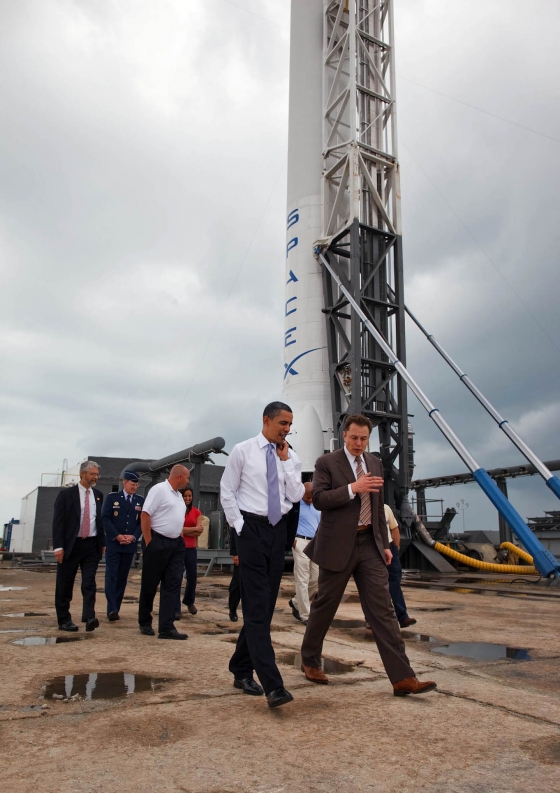The Senate plan adds a budget for the development of a heavy launcher and adding a shuttle mission, and subtracts them from technology development and the planned aid to private space ventures

By Nancy Atkinson
Last Thursday, the Senate Committee on Commerce, Science and Transportation unanimously approved a bill that would add one shuttle mission and require NASA to develop a heavy launch vehicle and a crew launch vehicle as early as the next budget year. The new law cancels the Constellation program, but designates NASA to begin work immediately on a new launcher that will be ready by 2016, along with a crew spacecraft. The new law takes budgets from two things on which it relied President Obama's budget proposal: Development of commercial space systems and development of breakthrough innovation and technologies.
The commercial space initiatives will receive only $1.6 billion for development over the next three years, in contrast to Obama's plan to invest $3.3 billion in commercial rocket development companies between 2011 and 2013.
Obama proposed a budget of $6 billion over five years for technology development, while the Senate proposal cuts this budget to $950 million over three years. These two components in the proposal will be a big disappointment for those who want to plan for the future and not just the short term of a few years ahead.
The plan is promoted mainly by Senator Bill Nelson of Florida who said that it is a plan of compromise between the Obama plan and those in Congress who oppose it. "The goal is to preserve the leadership of the United States in space exploration and to maintain the employment of as many talents as possible among the people of the rocket industry," Nelson said following the unanimous approval of the proposal.
Nelson said that adding a shuttle flight could keep most of the Kennedy Space Center workers in place and advance the development of the heavy rockets, with an eye toward manned flights a decade earlier than Obama's vision of 2025. The new law would also provide funding for international space operations well into the XNUMXs the twentieth
Some, including business people and space advocates in Florida, have been critical of the draft bill because it reduces funds promised by President Obama for a privacy program and technology development, two things that could create jobs in the area. The development of the heavy launcher will begin now and not in 2015 as proposed by Obama.
But is it possible to develop a heavy launcher by 2016 or is the Senate asking NASA to do too much with too little money, as the Constellation program has already fallen victim to? Although Nelson said the law would support increased activity in the new field of science, aeronautics and technology and set a long-term goal for manned missions and increasing the human presence beyond Earth orbit, no target was cited.
Here are some of the differences between Obama's proposed budget and the Senate bill: Obama proposes to finish the shuttle project in February 2011, while the Senate proposes to extend it until the summer. As for the commercial space program - Obama proposes a budget of 3.3 billion dollars for the years 2011-2013, while the cent settles for 1.6 billion during the same period.
As for the Constellation program, Obama proposed canceling the program but continuing the development of a light version of the Orion capsule, while the Senate wants to cancel but speed up the development of a heavy launcher that can also carry astronauts to low altitude and continue the development of this Orion-like capsule. As far as technological development is concerned, Obama proposed to develop technological flagship programs for 6 billion dollars over five years, while the Senate proposes to settle for 950 million over three years.
In the field of education, the new law will support education initiatives such as teacher training, to strengthen NASA's role in developing a workforce with a strong scientific, technological, engineering and mathematical background. The law also requires NASA to look for alternatives to the management models of personnel, centers and capacity while enforcing a ban on mass layoffs in the short term until an employment plan is in place.

5 תגובות
Sorry for the ignorance, but the article assumes an automatic understanding of a heavy launcher or the development of capsules such as that of Orion. Who will tell me what the poet meant?
The Senate may be taking an unnecessary risk that could lead to the Challenger 2 disaster
In my opinion, Obama is right, if there is already privatization everywhere
It is better if he throws private money into space, that way the tasks will be cheaper
And the USA will win the premiere in another field - like
which developed most of the technologies on the Internet and in commercial computing.
On the face of it, it sounds like a populist decision.
They are looking to preserve jobs by preserving the existing one, and this at the expense of leaps forward.
They do not express support for the developing private industry, and can someone explain what is so urgent to them about a heavy launcher?
Going on the safe side, by and large.
Too bad.
The US should have entrusted all activities in space in low orbit to private companies and concentrated on the long range with an emphasis on Mars. At their rate they will not reach Mars in the next 30 years